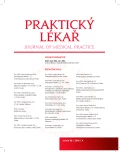Health literacy of the elderly
Authors:
I. Brabcová 1; H. Hajduchová 1; L. Šedová 1; S. Bártlová 1; L. Motlová 2
Authors‘ workplace:
Ústav ošetřovatelský, porodní asistence a neodkladné péče
Ředitelka: doc. PhDr. Sylva Bártlová, Ph. D.
1; Jihočeská univerzita v Českých Budějovicích
Zdravotně sociální fakulta
Děkanka: prof. PhDr. Valérie Tóthová, Ph. D.
1; Ústav sociálních a speciálně pedagogických věd
Ředitelka: doc. PhDr. Adéla Mojžíšová, Ph. D
2
Published in:
Prakt. Lék. 2018; 98(4): 178-181
Category:
Of different specialties
Overview
Aim:
The aim of this study was to assess the correlations among selected indicators in the elderly above 65 and their level of health literacy.
Methodology:
During this quantitative study, 326 seniors at the age above 65 years with a permanent address in the South Bohemian Region, CR, were addressed. The respondents’ health literacy was assessed using the standardized HLSQ-EU questionnaire.
Results:
Adequate, marginal and inadequate health literacy was identified in 39.1%, 37.8% and 23.1% of the respondents. Health literacy is negatively influenced by age and positively by education. Higher level of health literacy correlated with the respondents’ better socioeconomic situation. No correlation was confirmed between health literacy and sex or address.
Conclusion:
The elderly’s health literacy is influenced by a number of socio-demographic factors. When health promotion programs are planned and implemented, interventions need to be adapted to the preferences and possibilities of target groups.
Keywords:
prevention – seniors/the elderly – socio-demographic indicators – health – health literacy – health care
Sources
1. Baker DW, Wolf MS, Feinglass J, et al. Health Literacy and mortality among elderly persons. Arch Intern Med 2007; 167 : 1503–1509.
2. ČSÚ. Senioři v mezinárodním srovnání [online]. Dostupné z: https://www.czso.cz/csu/czso/seniori-v-cr-v-datech-2017 [cit. 2018-04-10].
3. ČSÚ. Statistická ročenka Jihočeského kraje – 2017 [online]. Dostupné z: https://www.czso.cz/csu/czso/4-obyvatelstvo-14px3qt699 [cit. 2018-04-10].
4. Gerber BS, Cho YI, Arozullah AM, Lee SYD. Racial differences in medication adherence: a cross-sectional study of medicare enrollees. Am J Geriatr Pharmacother 2010; 8(2): 136–145.
5. Holčík J. Systém péče o zdraví a zdravotní gramotnost. Brno: Masarykova univerzita 2010.
6. Chesser AK, Woods NK, Smothers K, Rogers N. Health literacy and older adults: a systematic review. Gerontol Geriatr Med 2016; 2 : 2333721416630492. doi: 10.1177/2333721416630492
7. Kučera Z, Pelikan J, Šteflová A. Zdravotní gramotnost obyvatel ČR – výsledky komparativního reprezentativního šetření. Čas. Lék. čes. 2016; 155(5): 233–241.
8. Manafo E, Wong S. Health literacy programs for older adults: a systematic literature review. Health Educ Res 2012; 27(6): 947–960.
9. McDougall GJ, Mackert M, Becker H. Memory performance, health literacy, and instrumental activities of daily living of community residing older adults. Nurs Res 2012; 61(1): 70–75.
10. Mosher HJ, Lund BC, Kripalani S, Kaboli PJ. Association of health literacy with medication knowledge, adherence, and adverse drug events among elderly veterans. J Health Commun 2012; 17(Suppl 3): 241–251.
11. MZČR. Zdraví 2020 – Národní strategie ochrany a podpory zdraví a prevence nemocí. Praha: MZČR a SZÚ 2014.
12. Nielsen-Bohlman L, Panzer AM, Kindig DA. (eds.) Health literacy: a prescription to end confusion. Washington, DC: National Academies Press 2004.
13. Patel PJ, Steinberg J, Goveas R, et al. Testing the utility of the newest vital sign (NVS) health literacy assessment tool in older African – American patients. Patient Educ Couns 2011; 85(3): 505–507.
14. Pelikan JM, Röthlin F, Ganahl K. Comparative report on health literacy in eight EU members states. The European Health Literacy Project 2009 – 2012 [online]. Dostupné z: http://ec.europa.eu/chafea/documents/news/Comparative_report_on_health_literacy_in_eight_EU_member_states.pdf [cit. 2018-04-10].
15. Prokešová R., Šulistová R., Kaas J. Einfluss ausgewählter sozio-ökonomischer Aspekte auf Gesundheitskompetenz in Region Südböhmen. Auspicia 2017; 2 : 26–34.
16. Sørensen K, Van den Broucke S, Fullam J, et al. Health literacy and public health a systematic review and integration of definitions and models. BMC Public Health 2012; 12 : 80.
17. WHO Europe. Health Literacy. The Solid facts. WHO 2013 [online]. Dostupné z: http://www.euro.who.int/_data/assets/pdf_file/0008/190655/e96854.pdf [cit. 2018-04-10].
18. Wilkinson R, Marmot, M. Social determinants of health: The solid facts. 2nd ed. Copenhagen: WHO 2003.
19. Wolf MS, Feinglass, Thompson J, Baker DW. In search of low health literacy: Threshold vs. gradient effect of literacy on health status and mortality. Soc Sci Med 2010; 70(9): 1335–1341.
Labels
General practitioner for children and adolescents General practitioner for adultsArticle was published in
General Practitioner

2018 Issue 4
- Advances in the Treatment of Myasthenia Gravis on the Horizon
- Hope Awakens with Early Diagnosis of Parkinson's Disease Based on Skin Odor
- Memantine in Dementia Therapy – Current Findings and Possible Future Applications
- Memantine Eases Daily Life for Patients and Caregivers
- Possibilities of Using Metamizole in the Treatment of Acute Primary Headaches
-
All articles in this issue
- Endometriosis and its effect on fertility and quality of life – literature review
- Searching for MODY in general practitioner’s surgery
- The importance of gait as the most natural physical activity in the human life style
- Imaging methods in pregnancy – indications and contraindications and use of contrast media
- The effect of the carer’s burden on family relationships
- Risks of imported diseases for the population of the Czech Republic
- Health literacy of the elderly
- Disability pension against social stress?
- General Practitioner
- Journal archive
- Current issue
- About the journal
Most read in this issue
- Endometriosis and its effect on fertility and quality of life – literature review
- Imaging methods in pregnancy – indications and contraindications and use of contrast media
- Disability pension against social stress?
- The importance of gait as the most natural physical activity in the human life style
